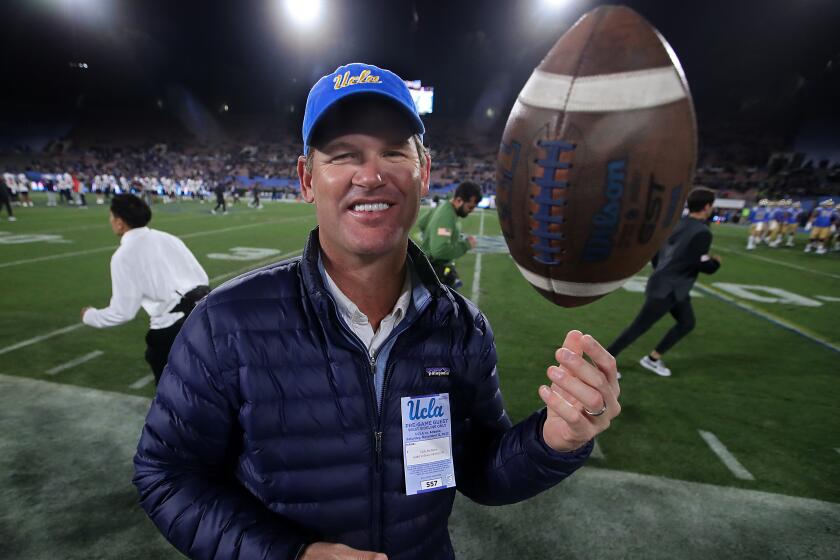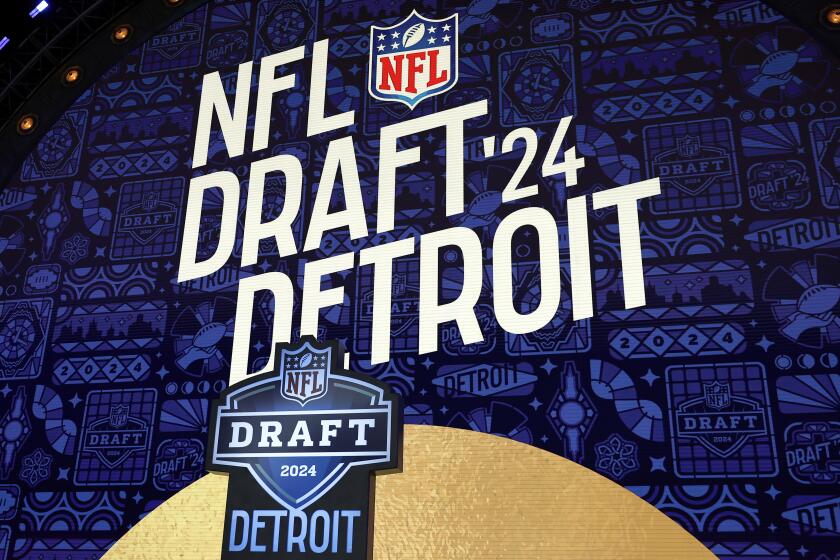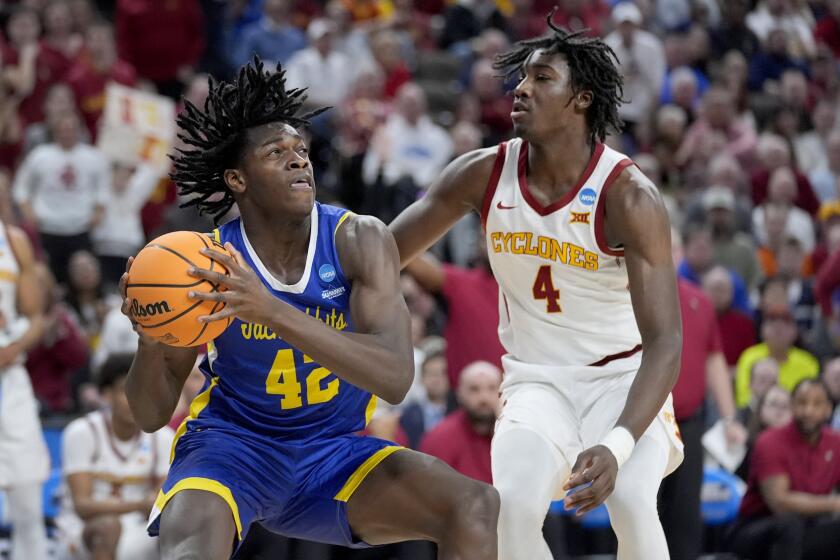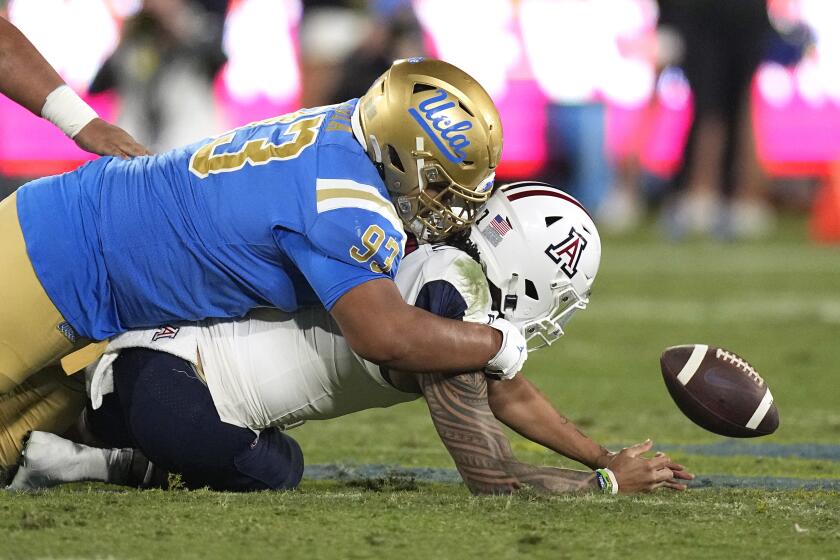Sadness of Father’s Death Hovered Over Howland
Ben Howland felt a void the first time his UCLA team took the court, and it had nothing to do with a marginally talented lineup.
One reason he took the job, leaving behind a national championship contender at Pittsburgh, was to be close to his parents. Bob Howland, a retired Presbyterian minister, wore a Bruin cap and a broad smile when his son was introduced as coach at a news conference.
Bob and Mary, married 50 years, planned to drive from their Santa Barbara home to Pauley Pavilion for every home game. They would sit behind the bench, near John Wooden and other decades-long members of the Bruin family.
Ben turned to the stands that November night of the opener. He looked at the seat next to his mom and realized that regardless of the score of the game, he already had suffered his first loss.
*
Bob Howland, 76, was wearing that Bruin cap when he fell May 24, tumbling down a steep hill at a Marin County park that overlooks the San Francisco Bay. Ben, his wife and two children were 10 minutes behind him, preparing to enjoy a barbecue the day after a cousin was married.
Ben pulled up to the gate and the park employee said an ambulance was ahead, that someone had fallen. Ben got a sick feeling.
“It’s probably my dad,” he thought.
Bob Howland was taken to a hospital, where he was released after a few hours. During the drive back to the park, though, he vomited, gripped Mary’s hand and slowly lost consciousness. Ben was at the wheel, frantically driving back to the hospital.
Time became a blur. Bob was in a coma, and Ben commuted from Los Angeles to Marin County while trying to settle into his new job. He was en route to the hospital, driving along the Central Coast on his birthday, May 28, when top recruit Jordan Farmar called his cellphone to commit to UCLA.
Bob died June 20. Ben, 46, was immersed in his work and has yet to allow himself time to properly grieve. Perhaps now, the season over, the impact will hit like one of the waves his father liked to watch from a bluff high above the Santa Barbara coast. Ben is braced for it.
“It was an accident, and he should still be alive right now,” he says. “We had a great relationship. He knew how much I loved him, I knew how much he loved me and my family, and how much he loved my mom and my brothers and sister.”
*
The season was more difficult than Howland thought possible. Twice before, at Northern Arizona and Pittsburgh, his teams endured growing pains before turning into winners.
But this was the third time around. He believed he could avoid some of the pitfalls and make an easier transition. After all, hadn’t he been the 2002 national coach of the year?
A 9-3 start was promising. The players were saying they had bought into Howland’s philosophy of rugged defense, unselfish offense and relentless rebounding.
Then without warning, the losses began to pile up. Opponents employed zone defenses, daring the poor-shooting Bruins to launch from the perimeter.
Confidence visibly wavered and Howland was unable to do anything to halt a skid that included 14 defeats in the last 16 games. Losses in the last moments at California, at Arizona State, at USC, at Oregon, and, finally, against Washington in the Pacific 10 Conference tournament, were especially dispiriting.
His methods were openly questioned. He doesn’t understand the mindset of Southern California kids, critics said. The offense had too many plodding sets. He ought to let the Bruins run. Stubbornness. Maybe that’s his Achilles’ heel.
Bob Howland would have comforted his son and offered some perspective. He had counseled hundreds of parishioners in 33 years as a minister. He was a gentle soul and a wise man, educated at Princeton Seminary and ordained the day Ben was born in Lebanon, Ore.
He had his son’s back, and he had his ear.
“He’d been through this with me,” Howland said. “He would have said, ‘You’ve done it before, you guys are going to do it again. This is a necessary part of the process.’ ”
*
Howland recognizes parallels between coaching and the ministry. Coaches, like pastors, must inspire their flock of true believers. Both engage in a fair amount of sermonizing, teaching and counseling, a coach doing so in a more heated environment and employing decidedly coarser language.
It follows that sons of ministers gravitate to coaching. Examples are Gonzaga Coach Mark Few, whose father is a Presbyterian minister, and Laker Coach Phil Jackson, whose parents were Pentecostal ministers.
“One difference about a basketball coach, the bottom line is either the W or the L,” Howland said. “But it’s also about building something, it’s about character, people giving themselves for the common good, the team.”
When he preaches the “all for one, one for all” philosophy, it’s as if he is on a pulpit. His eyes widen and he points his hands skyward as if seeking divine blessing.
“My team at Pittsburgh is the greatest example of unselfishness and giving of oneself,” he said. “They bought into that and it’s brought those kids championships, and it’s brought all those kids so much glory.”
He pauses.
“That’s what has to happen here.”
Most Bruin fans have been patient. They want to believe Howland is the right man to restore the winning tradition that began under Wooden and continued to a lesser degree under a succession of other coaches.
The fans also are knowledgeable, recognizing when screens are set and whether players are boxing out under the boards. They noticed that Bruin defensive intensity was ratcheted up several notches, even in late-season games when there was little to play for besides pride.
Howland talked early in the season about how losing is like dying, but he kept waking up the morning after a defeat. His players were resilient too, which impressed him.
“Even as tough as year as this was, I caught myself a couple times at practice, thinking, ‘I love coaching,’ ” he said. “We’ve come back from getting our butt kicked and these kids are still really trying, trying to play, to do what I ask them to do.
“I really love that spirit. No one quit. We were just not good enough.”
The idea that the team has little talent doesn’t sit well with the players who will return, which includes everyone except senior starting forward T.J. Cummings and seldom-used senior reserves Jon Crispin and John Hoffart.
“We have a lot of talent on this team, everybody can play the game,” center Ryan Hollins says. “There are ways we can get better, but to say we have less talent than other teams isn’t the way we see it.”
Hollins, who will be a junior, is one of four returning starters. Point guard Cedric Bozeman, a three-year starter, and leading scorer Dijon Thompson will be seniors. Talented forward Trevor Ariza will be a sophomore.
Only Ariza is a sure bet to hold his starting spot, although he could split time between the two forward spots. Senior guard Brian Morrison, injured much of last season, will push Thompson, who might play more small forward than shooting guard.
The four touted incoming freshmen -- guards Arron Afflalo and Farmar, forward Josh Shipp and center Lorenzo Mata -- are expected to contribute immediately. But Howland does not believe they are saviors.
“My feeling is that history shows that the kids returning are typically the key to success,” he says. “It takes time. To think that because four freshmen are coming in, we are going to be a top-five team in the country [is wrong]. It’s going to take the dedication by the returning guys.”
*
Howland will take a week off beginning today. There will be time with his wife and kids, and time with his mother. There will be time to reflect on his father’s life, time to appreciate that the teachings of an unpretentious, gentle minister will be passed on to UCLA basketball players through the booming, no-nonsense voice of his son.
“I was raised to believe you are supposed to love everybody,” Howland said. “My dad taught not only tolerance, but appreciation for every human being.
“He was all about doing the right thing. That’s something he taught me. He always did the right thing, no matter if it hurt, no matter if it meant admitting you were wrong. I’m still working on being that kind of person.”
Go beyond the scoreboard
Get the latest on L.A.'s teams in the daily Sports Report newsletter.
You may occasionally receive promotional content from the Los Angeles Times.




